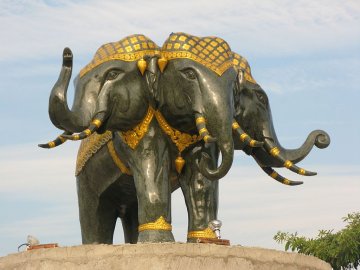Elephant Symbolism
The elephant has always been a majestic and somewhat mystical animal. There really is no creature on earth quite like an elephant, which is why elephant symbolism has permeated through the many cultures in lands where this large mammal is indigenous.
Cultural Roots and Significance
In Asian cultures, the elephant symbolizes wisdom and strength. In African cultures, the elephant also reflects wisdom. In the Ashanti tradition, elephants were thought of as reincarnated human leaders from past times. Elephant symbolism is common throughout many religions. The Hindu religion, in particular, has a main deity named Ganesha. Ganesha has a human body and an elephant's head.
The Elephant in Buddhism
Many are likely familiar with the imagery of the elephant in the Buddhist tradition. This is thanks to the importation of Buddhist art to the Western world. The image of the elephant in Buddhism symbolizes inner strength.
There are actually two elephants in the Buddhist tradition, the gray and the white elephant. The gray elephant reflects a wild creature that runs amok and is the symbol of a cluttered mind. The white elephant is the symbol of the mind that has been trained to be strong and calm.
Earliest Records of Elephant Symbolism
The earliest records of symbolic depictions of elephants was during prehistoric times. Drawings of elephants are found in many ancient rock carvings. To some degree, the imagery of the elephants indicates an interest in the family life of elephants.
Speculation exists that early humans may have looked towards the social and family structure of elephants as guidance for their own family units. Since these rock images date back thousands of years, there is no accurate record of what the exact significance of the symbolism is.
The majestic elephant most definitely has had a long standing influence on many cultures. We can see this through the scores of symbolic images that have captured the great beast for many millennia.

